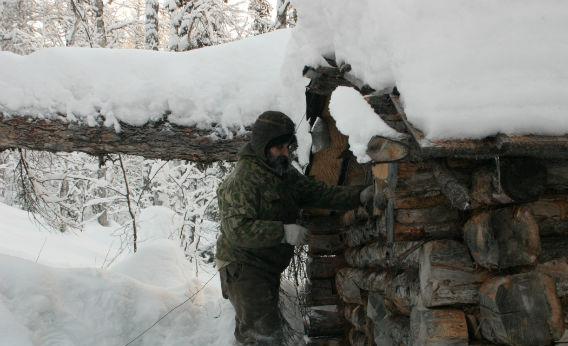This is the quote that really resonates with me after watching this movie several times:
Living in such extreme conditions is part of its story, but “Happy People” also highlights the dignifying effects that nature has on humans. (Gennady talks about despising greed in trappers — those that would set their traps too early, in an effort to turn cheap coin.)
When Gennady talks about despising the greedy, uncaring trappers, I was surprised because it is a thing that I learned early about trapping. Ethics are a large part of life and trappping, and I was vindicated by the words Gennady spoke concerning his opinions on the small population of trappers, ruining it for the responsible, educated, and respectful trappers.
ON FEBRUARY - 14 - 2013 0 COMMENT
Title: Happy People: A Year in the Taiga
Directors: Werner Herzog and Dmitry Vasyukov
Director Werner Herzog has lived life as a sort of cinematic pirate, striking out to and fro, and using the medium of film more often than not to satisfy his immense, globe-spanning curiosities, in both narrative features (“Fitzcarraldo,” “Rescue Dawn”) and documentaries (“Cave of Forgotten Dreams”). A stirring meditation on the human spirit in extreme conditions, and a work of a certain piece with his nonfiction explorations “Grizzly Man” and “Encounters at the End of the World,” Herzog and Russian co-director Dmitry Vasyukov’s “Happy People: A Year in the Taiga” delves into the lives of trappers and indigenous peoples living around Bakhtia, a remote town of 300 in the wintry plains of Siberia.
An unforgiving expanse one-and-a-half times the size of the United States, where a temperature of 30 degrees below zero Fahrenheit is considered a mild day in the winter, the Siberian Taiga is reachable only by helicopter or boat. The movie centers mostly on Gennady, a middle-aged trapper who oversees a 900-square-mile parcel of land, consigned to him during communist times, where he clears snow from his main cabin and outpost dwellings, splits wood to make skis, strips birch tree bark to make a homemade mosquito repellent, and constructs and sets 1,000 traps during the springtime months – all using techniques passed down from many generations.
“Happy People” was originally birthed by Vasyukov, who, not terribly unlike the filmmakers of “Restrepo,” lived for over a year with his subjects in remote Siberia, in order to craft a four-hour work for Russian television that captured and celebrated this fading way of life. This film represents Herzog’s edit of that, but it’s no mere unthinking abridgement. Anchored by a characteristically ruminative voiceover from the filmmaker, “Happy People” also reflects Herzog’s passion and fascination for the often unforgiving nature of the wild.
The footage itself is fascinating, but more in line with something like “Interview Project” or “Darwin: No Services Ahead” than the willful aesthetic remove of Lucien Castaing-Taylor’s minimalist “Sweetgrass.” Vasyukov and Herzog have a keen, intuitive grasp of when to let this material speak mostly for itself — as with the construction of a wooden canoe by one of the last indigenous persons trained in the craft — and when and where to interweave Gennady’s ruminations on his work and life, and its relationship to something like domesticated farming (“In the wild an animal knows that no good can come from me, from man — here, it’s about who outsmarts whom”).
Living in such extreme conditions is part of its story, but “Happy People” also highlights the dignifying effects that nature has on humans. (Gennady talks about despising greed in trappers — those that would set their traps too early, in an effort to turn cheap coin.) In this sense, the film’s surprising emotional scope is as expansive as its setting. It’s a mesmerizing portrait of human resilience, but a reminder as well that we remain tethered to the natural world, despite our increasingly wireless existence in a digital age.
Read more: http://www.shockya.com/news/2013/02/14/happy-people-a-year-in-the-taiga-movie-review/#ixzz39LbL3m44


No comments:
Post a Comment